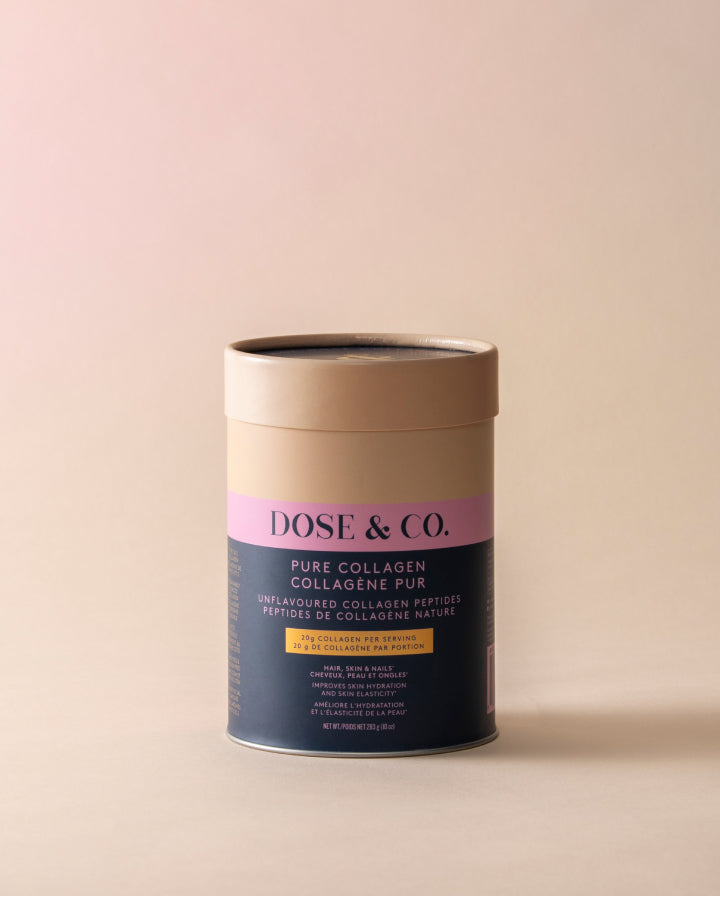Here's What the Science Says
Collagen and the signs of ageing
As we get older, our bodies produce less and less of the collagen protein. This can transgress towards damaging our health.

- Wrinkles
The skin loses elasticity and the ability to remain hydrated [3][5][6].
- Weak bones
Bone structure becomes thin and more prone to cracking - related cause of osteoporosis [7]
- Muscular wasting
Muscles begin to reduce and have difficulty reforming after exercise.
- Joint pain & stiffness
Cartilage, tendons, and other connective tissue need collagen to remain strong - symptoms of arthritis [8].
- Wound Healing
May take longer without sufficient collagen levels.
- Thinning of hair or damaged cuticles
Hair is mostly made from the protein keratin, a key component of collagen.
Besides aging, it is also evident that athletes can face joint deterioration that can be aided by collagen supplements.
Benefits of collagen supplements backed by research
Collagen supplements have been studied in a wide but shallow pool of analytical research. This list discusses a handful of the findings from the available literature:
-
Collagen Benefits for Wrinkles and Skin Hydration
- Proksch et al. (2013) A study of 114 women aged 45-65 years old found that eye wrinkles were reduced/improved on consuming a collagen supplement. Results were noticed during the 8 weeks of ingestion, and continuing 4 weeks afterwards.
- Proksch et al. (2013) Another study by the same team. 69 Women were tested for skin elasticity while consuming specific peptide collagen supplements. Results showed significant improvements and no side effects
- Asserin et al. (2015) Found significant increases in skin hydration from collagen supplementation. A slowing of the fragmentation of the skin cells. Effects persisted 12 weeks after the study.
- Borumand & Sibilla (2014) investigated a commercial hydrolyzed collagen supplement, finding collagen density and skin firmness was increased significantly by oral consumption. The results continued 12 weeks after treatment.
-
Collagen Benefits for Bone and Joint Health
- Brav et al. (2016) conducted a systematic review of literature and concluded collagen supplementation could be complimentary to osteoarthritis and osteoporosis treatment
- Clark et al. (2008) 74 athletes took a daily collagen supplement over 24 weeks to prevent joint pain and possibly reduce the risk of deterioration.
- Schauss et al. (2012) Found collagen supplements to be beneficial to sufferers of joint pain, and suggested it as a complementary treatment to osteoarthritis.
- Moskowitz (2000) Supports using collagen for treating osteoarthritis and osteoporosis, as well as its long-term safety.
How can we absorb collagen?
Oral consumption of collagen is available in supplements or animal products. More specifically, it is found in the skin of chicken, pork, beef, fish; as well as the broths of bone. Our bodies break down the protein to form smaller peptides, which are then combined into new forms of protein.
Collagen supplements are already broken down (hydrolyzed) into peptides. There is no research yet on which is more efficient, though it seems supplements are a more direct method. They are also without the trans fats typically associated with some of these foods.
Collagen supplements could improve your health
The visible signs of aging such as wrinkles, dry skin, brittle nails and thin hair could be reduced significantly by regularly supplementing collagen.
We often associate youthful appearances with bright and bouncy skin. When the skin is adequately hydrated, and is full of collagen proteins, it feels softer and looks ‘fuller.’

Less visible but more palpable is damage from a lack of collagen is caused to bone and joint health. Cartilage, ligaments, muscles, and tendons all require collagen for function and repair throughout our lives.
Stiffness, aching movements, and susceptibility to breaks should all raise the question about having enough collagen in your system. Thankfully, it is possible that by using supplements to boost collagen intake, we can increase our natural production and begin to restore free movement.
Opinion summary
Scientific research is broad but slim when it comes to collagen supplements. It is fair that the level currently available is not a sufficient body of proof. However, the signs are promising. They show a positive range of benefits without side effects. The majority of the body’s structure, growth and movement is dependent on collagen to operate.
It is wise to seek medical advice if you are dealing with a serious condition that may benefit from a collagen supplement. Our body will deteriorate with age due to losses in collagen production. A growing body of research suggests that supplementing our diet with collagen can boost production and give us the strength to feel young.
References:
[1] Oral collagen supplement: a systematic review of dermatological applications
[2] Healthline - Top 6 benefits of a collagen supplement
[3] Medical News Today - Collagen supplements
[4] Collagen: the fibrous proteins of the matrix
[5] Skin anti-aging strategies
[6] Inhibition of Type 1 procollagen synthesis…
[8] Type II collagen degradation and its regulation in articular Cartilage in osteoarthritis

